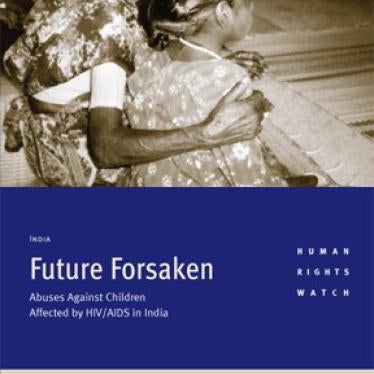Sujata Rao
Assistant Secretary and Director General
National AIDS Control Organization
Ministry of Health and Family Welfare
Government of India
Dear Ms. Sujata Rao:
Thank you for meeting with Human Rights Watch in July to discuss Human Rights Watch’s research on children affected by HIV/AIDS.
We note several important steps recently taken by the government of India towards improving protection for children living with and affected by HIV/AIDS. These include the roll-out of pediatric antiretroviral therapy, the attention to children in the National AIDS Control Programme Phase III (NACP-III), and the government’s commitments at the 2005 National Consultation on Children Affected or Vulnerable to HIV/AIDS, the 2007 National Meeting on the Framing of Policy for Children and AIDS in India, and in the National Plan of Action for Children, 2005.
Human Rights Watch nevertheless remains deeply concerned about the effect on children in India of widespread discrimination against people affected by HIV/AIDS. UNICEF’s 2007 report, “Barriers to services for children with HIV-positive parents in five high HIV prevalence states of India,” concludes that discrimination is a primary barrier preventing AIDS-affected children from accessing essential services such as education and health care. This follows documentation of the problem in our report Future Forsaken: Abuses Against Children Affected by HIV/AIDS in India, (https://www.hrw.org/reports/2004/india0704/), which was based on field research in three Indian states and Delhi.
While the Indian government has been working on legislation to protect those living with and affected by HIV/AIDS from discrimination, legislation and policies are not enough to protect vulnerable groups unless accompanied by vigorous implementation.
Based on our experience in working on these issues in other countries, we respectfully share our recent concerns and recommendations to prevent discrimination against children affected by HIV/AIDS.
We urge you to use your office to:
· Intervene with state education, health, social welfare and orphan care departments to prevent discrimination by schools, parents of other students, health care providers, and child care institutions. Rather than one-time events, a systematic plan, including public education around preventing discrimination, is needed.
· Ensure that professionals who work with AIDS-affected children receive better training directed at preventing discrimination, in particular on how HIV is not spread.
· Do more to encourage the government to pass legislation that follows international guidelines proscribing discrimination against people living with HIV/AIDS.
We note that while the Adolescent Education Program is stated to cover secondary and senior secondary schools, the program has faced resistance in implementation at the state level, including in high prevalence states. Moreover, the program is introduced at an age at which many children, especially girls, are no longer attending school. Children not attending school, especially those living on the street or working in the worst forms of child labor, may be the most vulnerable to HIV transmission. We recommend that your office do more to promote comprehensive, accurate, and age-appropriate AIDS education for all children—both in and out of school. For example, HIV/AIDS education could immediately be provided to children in government institutions, including juvenile justice centers and hostels. HIV/AIDS education should cover the correct and consistent use of condoms as the most effective way to prevent HIV transmission during sexual intercourse, including in long-term unions. It should also include information on gender inequality that helps put women and girls at risk of HIV transmission in India.
The roll-out of pediatric anti-retroviral therapy for some 6,000 children since 2006 is particularly encouraging. However, based on our recent information from healthcare and other service providers, particularly in rural areas, we are concerned that the most marginalized children are unable to benefit. These include children who live far from areas where the drugs are distributed and orphaned children. Additional assistance, including pediatric counseling, and additional resources for caregivers’ transportation and sufficient nutrition, is needed to reach these children.
While we recognize that other ministries and departments have important roles to play in implementing these recommendations, and we are urging them to do so, we believe that NACO’s role gives it extra responsibility and leverage to ensure that children are protected from discrimination and that their rights to education, health care, and information are fulfilled.
Thank you for your consideration of our concerns. We would welcome the opportunity to discuss them in the future with your office.
Yours truly,
Zama Coursen-Neff Brad Adams
Deputy Director Executive Director
Children’s Rights Division Asia Division
Human Rights Watch Human Rights Watch
cc: Minister of Health







